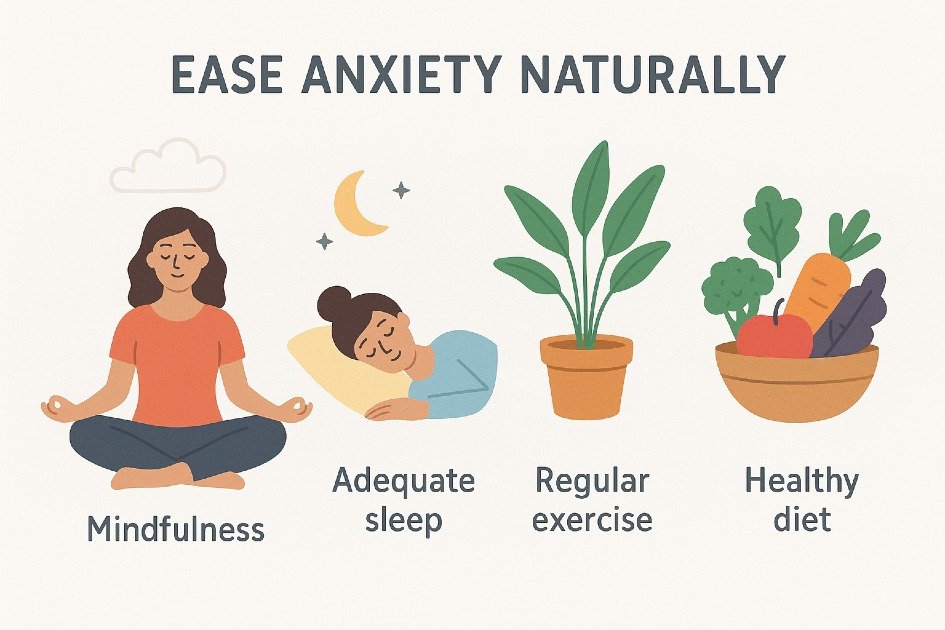Have you ever wondered why some people seem to calm their minds faster, even when life feels chaotic? That is the teachable power behind exploring beneficial methods that help you ease anxiety naturally.
Natural strategies, such as mindful breathing and restorative sleep habits, can help ease anxiety without side effects. These practices can be done at home, at work, or on the go, and can strengthen resilience long term.
Harvard Health suggests that belly breathing, a natural method that involves three slow, deep breaths, can help alleviate anxiety and restore calm.
Food, movement, and mindful rituals play a significant role in emotional balance, and integrating these habits into daily life can help ease anxiety in the moment and strengthen resilience long term.
This guide outlines holistic insights that help develop a balanced approach to manage anxiety without reliance on medication, fostering a healthier, and more tranquil self.
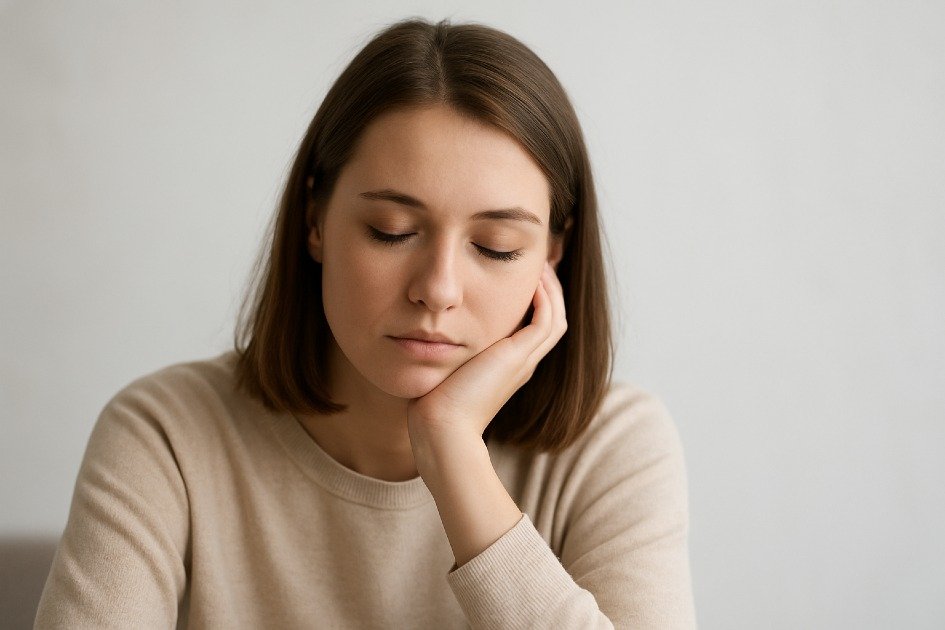
Understanding Anxiety and Its Impact
Anxiety is a body alarm system that works overtime, causing overwhelming feelings and wasting energy. Understanding its effects can help individuals take natural steps to ease anxiety and regain control.
What Anxiety Really Is: Beyond Everyday Stress
Stress is common, but anxiety can linger even after a stressful moment, causing constant unease and presenting as endless “what if” thoughts or a knot in the chest.
Anxiety leads to overreaction in everyday situations, draining confidence and making life harder when left unmanaged.
Journaling worries on paper helps separate thoughts from reality, separates thoughts from reality, and eases anxiety and improves sleep by unloading a cluttered desk in the mind.
I have learned that anxiety is not weakness—it is my body’s signal. When I notice it, I use simple tools to calm my mind and make my day feel lighter.
How Anxiety Affects Your Mind and Body
Anxiety is a full-body experience, causing heart rate, sweating, muscle tightening, and slow digestion, often accompanied by stomach troubles.
The body’s inability to differentiate between real danger and imagined stress can lead to constant alertness, weakening the immune system and reducing energy.
Breathing exercises, such as a simple 4-7-8 pattern, can help calm the nervous system and ease anxiety, making them beneficial practice for both work and sleep.
When I take a few deep breaths and give my body a quick reset, I feel my anxiety drop. It helps me calm down, even when life feels too much.
Why Natural Approaches Can Make a Difference
Natural strategies offer accessible tools for resilience, empowering individuals to build resilience without relying solely on external solutions, unlike medication.
Quick fixes for anxiety do not teach self-regulation; deeper strategies like mindful breathing, exercise, and herbal teas help the nervous system find balance on its own.
Experience with various tools, such as walking outside, lighting a lavender candle, or listening to calming music, to find what works best for you.
Harvard Health suggests that daily mindfulness practice can alleviate depression and anxiety and encourage healthier lifestyle habits.
Each morning, I roll out my mat and stretch gently to wake my body. I pause, close my eyes, and breathe slowly. This simple habit calms my mind and eases anxiety.
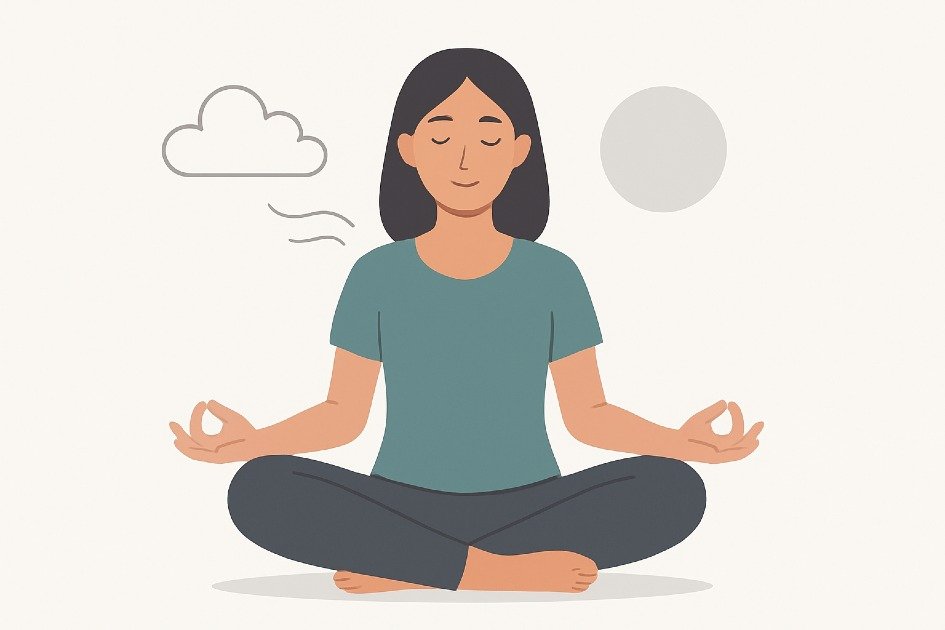
Mindful Practices to Calm the Mind
Mindfulness is a powerful tool for easing anxiety by reconnecting with the present moment. It helps pause, breathe, and regain control over thoughts, providing practical strategies for everyday use.
Deep Breathing Exercises You Can Do Anywhere
Why it matters:
Shallow breathing triggers stress response, while deep breathing slows heart rate, reduces muscle tension, and calms racing thoughts, signaling the nervous system to relax.
How to do it:
- Find a comfortable spot to sit or lie down and relax your body
- Breathe in through your nose for four counts, letting your chest and belly rise.
- Take a deep breath and hold it for four counts to calm your mind and lower stress.
- Breathe out slowly through your mouth, counting to six.
- Do this for five minutes, or longer if it helps.
- Follow a breath-focused meditation app to guide your practice and track your progress.
I notice my anxiety ease when I take even a few quiet minutes during stress.
The Power of Meditation and Stillness
Why it matters:
Meditation enhances emotional resilience, reduces rumination, and physically alters brain regions associated with stress regulation by training the mind to observe thoughts without judgment.
How to do it:
- Choose a calm place where no one will interrupt you.
- Sit tall with a straight back and relaxed shoulders. Keep your feet flat on the floor and breathe deeply to stay alert and calm.
- Pay attention to your breathing, repeat a calming word, or follow a guided meditation to center your mind.
- Notice when your mind wanders and calmly brings your focus back—without judging yourself.
- Begin with five minutes each day and slowly build up to 15–20 minutes.
I meditate every day to stay calm and naturally reduce my anxiety.
Journaling Your Thoughts to Release Mental Tension
Why it matters:
Journaling helps alleviate anxiety by externalizing worries, identifying patterns, and gaining perspective. It also engages the reflective brain, reducing emotional intensity.
How to do it:
- Use a notebook or digital journal to track your thoughts, ideas, and progress daily.
- Every morning or evening, jot down your thoughts, worries, or stressful moments to clear your mind and ease stress.
- Spot what sets off your feelings and tracks repeating patterns.
- End each entry with a positive thought or a simple action to manage challenges.
- Use guided anxiety journals to get clear prompts and stay on track with your thoughts.
I use this simple habit to turn my racing thoughts into a clear plan, helping me calm anxiety and stay grounded.
Progressive Muscle Relaxation (PMR) for Instant Calm
Why it matters:
PMR, or progressive muscle relaxation, is a technique that helps the body release stress by intentionally tensing and relaxing muscles, enhancing body awareness and signaling the brain to relax.
How to do it:
- Find a quiet place and sit or lie down comfortably.
- Tighten each muscle from your toes up for 5–10 seconds, then let go slowly.
- Massage from your calves up to your thighs, then your abdomen, arms, and finish at your face.
- Notice the difference between tightness and ease in your body.
- Follow audio-guided PMR sessions to relax your muscles step by step and reduce stress.
I use PMR before bed or when I feel stressed, and it helps me relax my body and calm my mind.
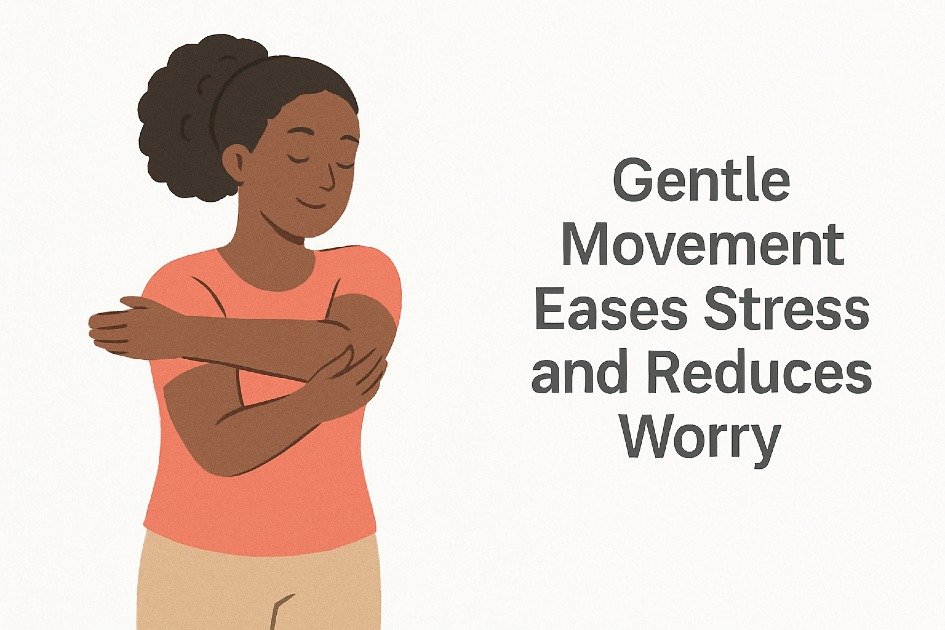
Movement That Reduces Worry
Physical movement can help ease anxiety by releasing tension in muscles and signaling the nervous system to calm down. It is a simple, enjoyable way to reconnect with the body.
Yoga Poses That Relax Body and Mind
Why it matters:
Yoga, a practice that combines physical postures, breathing, and mindfulness, reduces cortisol levels, enhances parasympathetic nervous system activity, eases anxiety, improves flexibility, and enhances mental clarity.
How to do it:
- Spend 10–15 minutes daily on gentle poses like Child’s Pose, Cat-Cow, and Legs-Up-The-Wall to relax your body and calm your mind.
- Breathe slowly and deeply as you move from one posture to the next.
- Finish with a brief Savasana to help your body fully absorb the calm.
Walking in Nature: A Simple Yet Powerful Remedy
Why it matters:
Nature walks offer aerobic activity and mental restoration, reducing blood pressure, easing tension, and releasing anxious thoughts. They also stimulate serotonin and vitamin D production, promoting emotional resilience.
How to do it:
- Take a 20–30 minute walk every day in a nearby park or trail to boost your energy, mood, and health.
- Keep your phone silent or out of reach to stay focused and avoid distractions.
- Notices the sounds, sights, and touches around you—leaves rustling, birds singing, or sunlight warming your skin.
- Walk briskly so your heart beats faster but you can still talk easily.
Strength Training and Cardio for Stress Release
Why it matters:
Strength training and cardio workouts boost mood, improve sleep quality, enhance focus, and alleviate anxiety by releasing endorphins, which are natural mood elevators.
How to do it:
- Do 2–3 cardio workouts each week, like brisk walking, cycling, or swimming, to boost heart health and energy.
- Do strength exercises like push-ups, squats, or resistance band moves to build strong muscles and bones.
- Start with 10–15 minutes and slowly add more time as you get comfortable.
- Track your activity to stay motivated and see how exercise eases anxiety.
I have found that moving my body each day helps ease my anxiety. Small steps and enjoying the activity make it stick. Over time, I feel calmer just by being in motion.
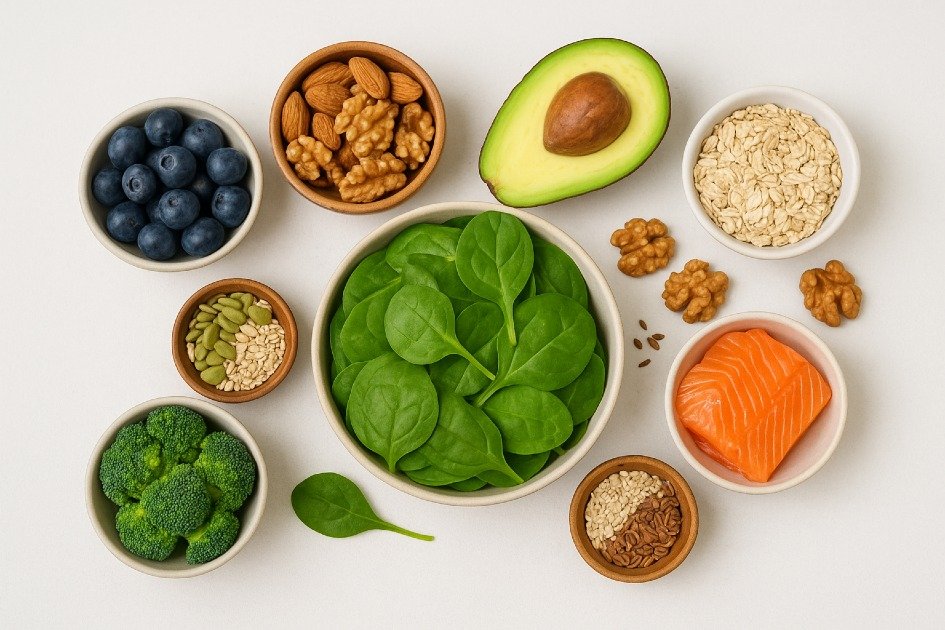
Food and Nutrition for a Peaceful Mind
Diet influences emotions, energy, and anxiety. Intentional changes in food can amplify or create a calming environment, reclaiming control and serenity throughout the day.
Calming Foods That Help Regulate Mood
Why it matters:
Nutrients like serotonin and GABA affect mood and stress response, reducing anxiety. Consuming foods rich in these nutrients supports brain chemistry, easing anxiety.
How to do it:
- Eat leafy greens like spinach, kale, and Swiss chard. They are rich in magnesium, which helps your muscles relax.
- Add omega-3 foods like salmon, sardines, chia, or flaxseed to your diet to help calm brain inflammation.
- Eat nuts and seeds like almonds, walnuts, and pumpkin seeds for vitamin E and zinc, which help keep your mood steady.
- Eat oats and quinoa. They boost serotonin and give steady energy without spiking sugar.
Caffeine and Sugar: Friends or Foes for Anxiety?
Why it matters:
High caffeine and sugar intake can cause adrenaline spikes, intensifying anxiety and jitteriness, while moderation can improve emotional stability.
How to do it:
- Replace one cup of coffee or energy drink each day with herbal or decaf tea, like chamomile, to reduce caffeine and support calm focus.
- Cut back on sugary snacks and choose fresh fruit instead—it is naturally sweet and helps keep your blood sugar steady.
- Notice how coffee, chocolate, or soda affect your mood. Small tests can reveal patterns to help reduce anxiety.
Herbal Teas and Natural Supplements That Soothe
Why it matters:
Natural herbs and compounds have been found to have anxiolytic effects, aiding nervous system reset and promoting calmness, thereby complementing other anxiety-reducing strategies without pharmaceutical side effects.
How to do it:
- Drink green tea for L-theanine to relax your mind and stay focused
- Sip valerian root or passionflower tea at night to help your mind relax and improve sleep, which supports emotional balance.
- Try magnesium or ashwagandha supplements—they help your body handle stress naturally.
- Steeping your tea slowly tells your brain to relax, giving you a quick, calming pause in your day.
I find that small, steady changes to what I eat, and drink help me feel calmer and think more clearly. Pairing these habits with mindfulness and good sleep strengthens my resilience and keeps my mind light.
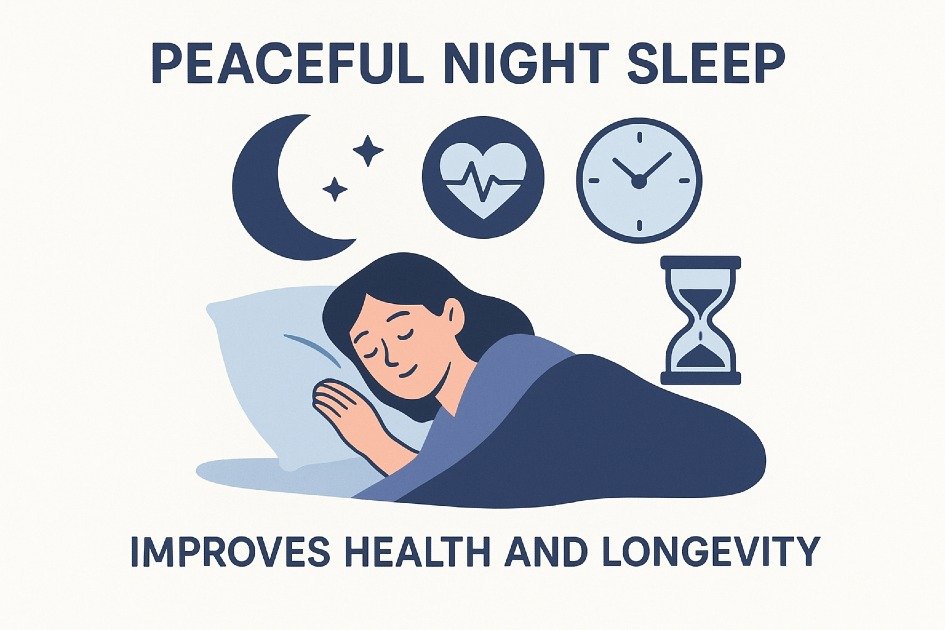
The Role of Restful Sleep
Sleep is crucial for mental and physical well-being, reducing anxiety, decision-making, and emotional resilience. Prioritizing sleep can be transformative, with practical steps for effective implementation.
Creating a Bedtime Routine That Promotes Relaxation
Why it matters:
Establishing a calming evening routine signals the brain to unwind, reducing nighttime worry and anxiety, and preventing irregular sleep patterns that can increase cortisol levels.
How to do it:
- Go to bed and wake up at the same time every day, even on weekends, to keep your body clock steady.
- Spend 15–20 minutes before bed on calming activities like reading or light stretching to relax your mind and body.
- Dim your lights and turn off devices 30–60 minutes before bed to help your body make melatonin and fall asleep faster.
- Diffuse lavender or. other calming essential oils to signal your mind it is time to relax
How to Reset Your Sleep Cycle Naturally
Why it matters:
Resetting your sleep cycle can improve mood, cognitive function, and emotional stability, thereby easing anxiety more effectively during the day.
How to do it:
- Step outside for 15–20 minutes each morning to soak up natural sunlight and set your body’s internal clock.
- Limit late-night exposure to blue light from phones, computers, and TVs.
- Skip large meals and caffeine 3–4 hours before bed to help your body rest deeply.
- Move your bedtime 15–30 minutes earlier each night to build a steady sleep routine.
Sleep Hygiene Habits That Reduce Nighttime Anxiety
Why it matters:
Poor sleep hygiene leads to restless nights, racing thoughts, and increased worry. Strengthening these habits promotes deep, restorative sleep, which helps alleviate anxiety.
How to do it:
- Keep your bedroom dark, quiet, and cool. Use blackout curtains and a white noise machine for better sleep.
- Use your bed only for sleep and intimacy. Keep working, phones, and scrolling out of bed
- Do a quick mindfulness or guided meditation before bed to calm your mind and sleep better.
- Avoid alcohol and nicotine at night; they disturb your natural sleep cycle.
I sleep well to calm my mind and balance my emotions. Paired with other anxiety-fighting habits, sleep has become my strongest tool for feeling peaceful.
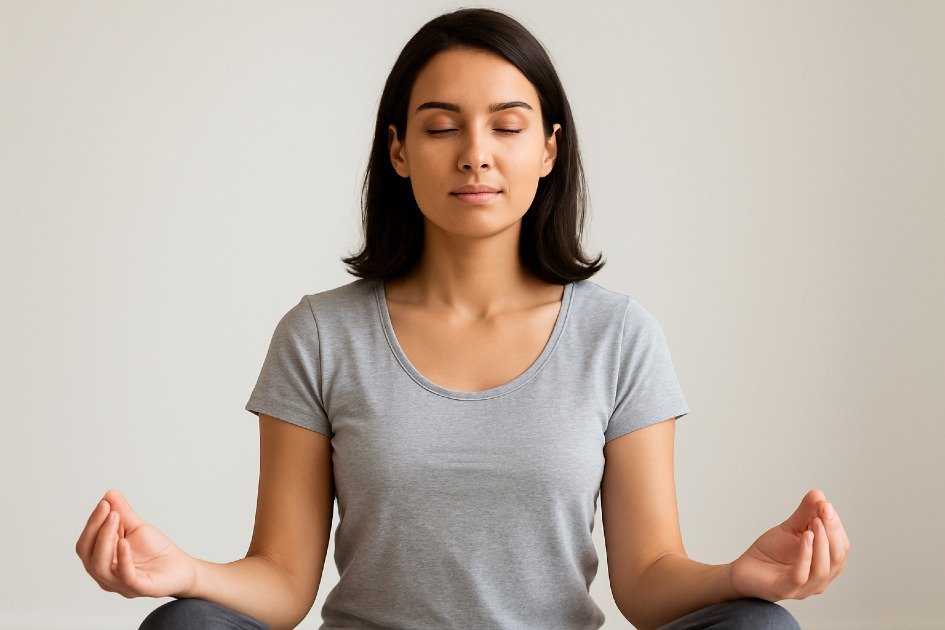
Breath and Relaxation Techniques
Breathing, often unconsciously, can ease anxiety by sending signals to the nervous system. Mindful practice of breath control and relaxation techniques can reduce racing thoughts, calm the heartbeat, and regain focus in stressful situations.
Progressive Muscle Relaxation (PMR)
Why it matters:
PMR aids in identifying and releasing physical tension, which in turn reduces cortisol levels, thereby easing anxiety naturally.
How to do it:
- Choose a calm spot and sit or lie down in comfort.
- Start with your toes. Squeeze the muscles for 5–10 seconds, then let them go. Feel the difference between tight and relaxed.
- Focus on each part of your body—calves, thighs, belly, arms, shoulders, and face—one at a time.
- Practice daily, even just 10 minutes, to grow calmness and focus.
- Use lavender oil while doing PMR to boost relaxation and ease stress.
Guided Imagery and Visualization
Why it matters:
Visualization can help alleviate anxiety by replacing negative mental images with calming, positive scenarios, triggering the parasympathetic nervous system, lowering heart rate, and fostering a sense of safety.
How to do it:
- Close your eyes and picture a place where you feel safe and calm, like a beach, a forest, or a quiet room.
- Use all your senses: feel sunlight on your skin, listen to birds sing, and breathe in the fresh scent of pine or the sea.
- Take 5–15 minutes each day for a mental break. Close your eyes, breathe deeply, and let your mind rest.
- Follow audio guides or apps to strengthen your mindfulness practice.
The 4-7-8 Breathing Technique
Why it matters:
The 4-7-8 method, which resets respiratory rhythm and calms the nervous system, can reduce stress hormones and help ease anxiety instantly.
How to do it:
- Breathe in through your nose for 4 seconds.
- Take a deep breath and hold it for 7 seconds to let oxygen reach every part of your body.
- Breathe out through your mouth for 8 seconds, letting go of tension.
- Do this cycle 4–6 times, ideally twice a day or whenever anxiety rises.
- Small daily actions train your body, so even one-minute counts.
Box Breathing for Mindful Control
Why it matters:
Box breathing is beneficial during high-stress situations, enhancing calmness and easing anxiety.
How to do it:
- Breathe slowly for four counts, filling your lungs fully.
- Take a deep breath and hold it for four counts.
- Breathe out slowly for 4 seconds.
- Pause and hold for 4 seconds, keeping your muscles engaged.
- Do this for 5–10 minutes in a quiet spot or during a calm moment in your day.
- Take a calming herbal supplement like chamomile for extra relaxation.
Combining Breathwork with Movement
Why it matters:
Breathwork, when combined with gentle movements, can release tension, increase circulation, and oxygen flow, promoting a deeper sense of calm and easing anxiety in both body and mind.
How to do it:
- Stretch slowly and carefully while taking deep, steady breaths.
- Inhale and lift your arms overhead, then exhale as you lower them slowly.
- Do 10–15 minutes of gentle yoga or Tai Chi daily to boost flexibility, balance, and calm your mind.
- A brief walk while paying attention to your breath can calm your nervous system fast.
I weave simple techniques into my day to ease anxiety. With practice, my mind and body grow calmer and stronger, turning stressful moments into manageable ones.
Recap: Embracing Calm, the Natural Way
Learning to ease anxiety naturally involves integrating mindful practices, restorative sleep, movement, and nurturing nutrition. This creates a sanctuary where stress loses its grip and clarity takes hold.
Harvard Health suggests that small habits like mindful movement, deep breathing, or better-sleep routines can help reduce stress and alleviate anxiety naturally.
Each small step, such as guided breathing, nature walks, or herbal tea, compounds over time, helping to ease anxiety.
The journey to calm is not linear, and investing in inner peace pays dividends in every aspect of life. Share your experiences and calming techniques to inspire others on their path to serenity.
Start today by breathing deeply, moving intentionally, and eating mindfully.
Frequently Asked Questions
Can natural remedies completely cure anxiety?
Natural remedies like mindfulness, yoga, and guided breathing can help ease anxiety and improve overall well-being. Combining these practices with professional guidance can create a powerful synergy to effectively ease anxiety.
How long does it take to notice results from natural methods?
Consistent practice of mindfulness techniques like journaling, calming supplements, meditation, exercise, and sleep routines can significantly shift mental state within days to weeks, with persistence being key.
Are supplements safe for everyone dealing with anxiety?
Natural supplements like chamomile, valerian root, and L-theanine can help ease anxiety, but individual reactions may vary. Consult a healthcare professional for safe, natural anxiety management.
Can exercise alone reduce anxiety symptoms?
Regular physical activity, such as walking, swimming, or yoga, can significantly reduce anxiety by releasing endorphins, enhancing neurotransmitter function, and lowering cortisol levels.
What should I do if natural remedies are not enough?
Despite natural anxiety management strategies, seeking professional help is essential. Cognitive-behavioral therapy and other evidence-based treatments are beneficial. Natural methods, stress-relief supplements, and mindfulness exercises can also be integrated.
Can lifestyle adjustments really make a difference?
Small, intentional changes like reducing screen time, optimizing sleep, and practicing gratitude can significantly ease anxiety, recalibrate the nervous system and promote balance.
Is it possible to ease anxiety while at work or in public?
Techniques like deep breathing, grounding exercises, and portable aromatherapy can help calm the mind, maintain focus, and ease anxiety without drawing attention.
How do I maintain consistency with natural methods?
Create a structured routine with small practices like meditation, journaling, or nature walks, tracking progress with apps to ease anxiety and build emotional resilience.
Can dietary choices influence anxiety levels?
Nutrient-rich foods, balanced hydration, and minimizing processed sugars support the nervous system, easing anxiety. Omega-3 fatty acids, magnesium, and B vitamins improve mood regulation.
Is it possible to ease anxiety without giving up productivity or social life?
Natural techniques like mindfulness, stretching, and relaxation tools can enhance focus, emotional clarity, and social confidence, allowing for a balanced lifestyle without compromising work, social connections, or hobbies.

